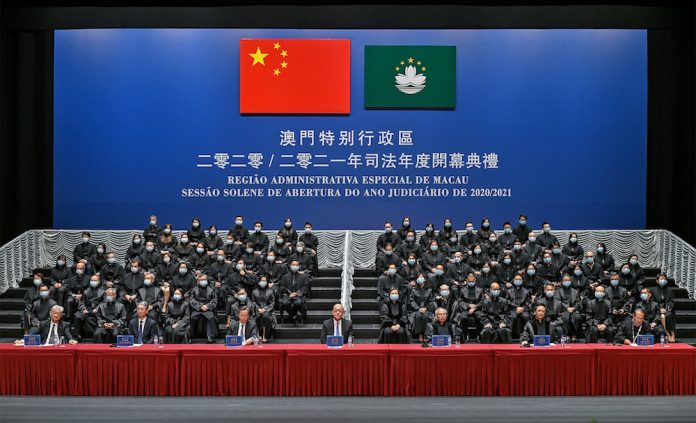It is always good to hear Chief Executive Ho Iat Seng assuring the public that the rule of law is a core value in Macau and that the government is committed to providing the city with better rule of law.
That same day Ho had attended the festivities for the 40th anniversary of the establishment of the Shenzhen Special Economic Zone (SEZ) together with President Xi Jinping and Hong Kong CE Carrie Lam but still found time to come and make his first inaugural speech for 2020/2021 Judicial Year opening.
The CE highlighted that the government would resolutely maintain judicial independence, firmly defend judicial justice and actively cooperate with judicial organizations to earnestly implement judicial organs’ judgments.
The last years have seen the region’s top courts make decisions that pass an image to the public that political considerations and sensibilities have more weight than the letter of the law, so it is at least assuring to see the of head of government committing himself to the legal framework and Basic Law that has well served the city for some 21 years.
In that same event, we saw Jorge Neto Valente, President of Macau Lawyers Association (AAM), declared that an in-depth debate on justice reform in the courts was “essential and urgent” but in the sense of reducing the “opacity” of local legal institutions so that local residents can feel that court decisions do not suffer from political interference.
It is then more peculiar to see the Court of Final Appeal (TUI) President Sam Hou Fai call in his official speech for the rethinking of the local Portuguese-style legal system.
The top judge argued that Portugal’s ethics, value system, customs, cultural heritage and many other aspects “diverge considerably” from those of the city’s inhabitants and therefore there were challenges in applying it.
At one point he expressed that it is difficult to transfer a legal system from a country with 10 million inhabitants and an area of nearly 100,000 square kilometres to a small jurisdiction like Macau’s that has a population of just about 600,000 with an area of only about 32 square kilometres, to then exemplify this assertion with the difficulty in the issue of recusal.
The close connections within the local community were described as an obstacle when it came to the withdrawal of a judge or prosecutor from a case on the grounds that they are unqualified to perform certain legal duties usually required from them because of a possible conflict of interest or lack of impartiality.
For the TUI judge the implementation of the ‘One Country, Two Systems’ principle in Macau had entered an interim stage and therefore the SAR has to review and analyse the challenges and problems that emerged when implementing the legal system originally from Portugal.
These statements seem to go against the initiatives by local authorities to propose the local legal framework as an important legal arbitration centre between China and Portuguese-speaking countries, and the years of training and development of human resources within the local legal system.
The local legal system is a result of the history and the ingenuity of the people that built up this city and those who devised the ‘One Country, Two Systems’ principle and the Basic Law, and it has served the SAR well.
To now claim that the whole system is inherently flawed because it was allegedly based on incompatible cultural and ethical differences seems an odd statement to make.
No legal system is perfect or immune to reforms, but changes should not be hammered in just for the sake of better integration with the Chinese legal system, especially if the characteristics of the local legal system have and can be greatly useful for the city, the region, and the country.
The local legal system can be based in Portuguese law but it is undoubtedly a Macau product and to argue that it is a wine that should be diluted until it loses all its value – just because – seems counterproductive.
What seems to be a good recipe for a working legal system, irrespective of cultural differences, is to improve the efficiency of courts and institutions, and having balanced decisions firmly grounded on the local law and common sense. And that is true for any place, irrespective of distance and size.
[MNA Editor-in-Chief]





















